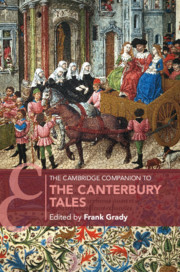Book contents
- The Cambridge Companion to The Canterbury Tales
- The Cambridge Companion to The Canterbury Tales
- Copyright page
- Contents
- Illustrations
- Contributors
- Preface
- Note on the Text
- Chronology
- Abbreviations
- 1 The Form of the Canterbury Tales
- 2 Manuscripts, Scribes, Circulation
- 3 The General Prologue
- 4 The Knight’s Tale and the Estrangements of Form
- 5 The Miller’s Tale and the Art of Solaas
- 6 The Man of Law’s Tale
- 7 The Wife of Bath’s Prologue and Tale
- 8 The Friar’s Tale and TheSummoner’s Tale in Word and Deed
- 9 Griselda and the Problem of the Human in The Clerk’s Tale
- 10 The Franklin’s Symptomatic Sursanure
- 11 The Pardoner and His Tale
- 12 The Prioress’s Tale
- 13 The Nun’s Priest’s Tale
- 14 Moral Chaucer
- 15 Chaucer’s Sense of an Ending
- 16 Postscript: How to Talk about Chaucer with Your Friends and Colleagues
- Reading Chaucer: Easier than You Think?
- Scholarship or Distraction? New Forums for Talking about Chaucer
- Talking about Chaucer with School Teachers
- Who Will Pay?
- Further Reading
- Index
- Cambridge Companions to …
Who Will Pay?
from 16 - Postscript: How to Talk about Chaucer with Your Friends and Colleagues
Published online by Cambridge University Press: 21 August 2020
- The Cambridge Companion to The Canterbury Tales
- The Cambridge Companion to The Canterbury Tales
- Copyright page
- Contents
- Illustrations
- Contributors
- Preface
- Note on the Text
- Chronology
- Abbreviations
- 1 The Form of the Canterbury Tales
- 2 Manuscripts, Scribes, Circulation
- 3 The General Prologue
- 4 The Knight’s Tale and the Estrangements of Form
- 5 The Miller’s Tale and the Art of Solaas
- 6 The Man of Law’s Tale
- 7 The Wife of Bath’s Prologue and Tale
- 8 The Friar’s Tale and TheSummoner’s Tale in Word and Deed
- 9 Griselda and the Problem of the Human in The Clerk’s Tale
- 10 The Franklin’s Symptomatic Sursanure
- 11 The Pardoner and His Tale
- 12 The Prioress’s Tale
- 13 The Nun’s Priest’s Tale
- 14 Moral Chaucer
- 15 Chaucer’s Sense of an Ending
- 16 Postscript: How to Talk about Chaucer with Your Friends and Colleagues
- Reading Chaucer: Easier than You Think?
- Scholarship or Distraction? New Forums for Talking about Chaucer
- Talking about Chaucer with School Teachers
- Who Will Pay?
- Further Reading
- Index
- Cambridge Companions to …
Summary
The dialectical relation of long-form scholarly work and short-form blogs, social media and other contemporary public writing about how the political meanings of sex in Chaucer’s time speak vividly to our own experience cannot simply be dismissed as crudely instrumentalist or naively transhistoricist. Such approaches can provide a powerful justification for why we teach Chaucer and for his cultural significance today. Flagging the Canterbury Tales as “our cultural legacy” in the context of current considerations of “rape culture” is a rhetorical move that makes a claim for the continued liveliness and urgency of past literatures by showing how the past still inheres in the present, how present discourses can suddenly make the past newly familiar, how the past is still lively.
- Type
- Chapter
- Information
- The Cambridge Companion to The Canterbury Tales , pp. 250 - 254Publisher: Cambridge University PressPrint publication year: 2020

